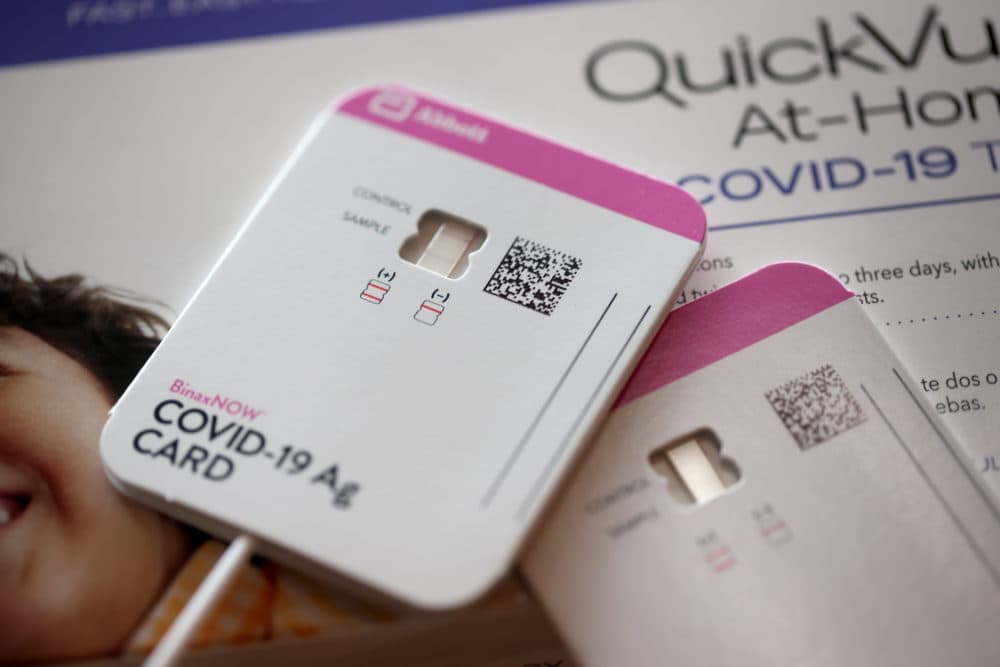Advertisement
Coronavirus Coverage
Mass. health insurers say they'll stop providing free at-home COVID tests

The state’s biggest health insurers have decided to stop providing free over-the-counter COVID tests next month, a move that could force many people to pay out of pocket in order to help detect and stop the spread of COVID-19.
Federal officials will end the COVID public health emergency on May 11 — and along with it, the requirement for health insurers to cover the costs of eight rapid antigen tests per member per month, regardless of whether a person has symptoms or a known exposure to COVID.
Individual insurers can choose to continue providing the tests for free. But Blue Cross Blue Shield of Massachusetts, Tufts Health Plan and Harvard Pilgrim Health Care told WBUR they have decided to end this benefit.
Beginning May 12, the insurers will cover only the costs of COVID tests ordered by clinicians. This is similar to how the companies cover other kinds of medical tests.
Combined, Blue Cross, Tufts and Harvard Pilgrim cover nearly 4 million people in Massachusetts.
“In line with 2022 guidance issued as part of the federal government’s declaration of a public health emergency, we temporarily covered over-the-counter COVID-19 test kits,” Blue Cross spokesperson Amy McHugh said in an email. “When the public health emergency formally expires on May 11, we will return to our prior policy, and over-the-counter COVID-19 tests will not be covered.”
COVID rapid tests typically cost about $24 for a pack of two. An individual with COVID symptoms may need several of these tests, because it may take several days of testing to detect an infection, and determine when the infection has cleared. The costs of testing could add up.
Asked about these increased costs for members, the insurers stressed that they will continue to cover COVID tests ordered by a doctor.
“Health care affordability is one of our top concerns,” said Kathleen Makela, a spokesperson for Point32Health, the parent company of Tufts and Harvard Pilgrim.
Advertisement
Seniors on Medicare also will lose access to free rapid COVID tests — unless they are covered by a Medicare Advantage plan that chooses to offer this benefit.
Tests will remain free for people on Medicaid programs, including MassHealth, until Sept. 30, 2024, according to the U.S. Centers for Medicare & Medicaid Services.
Julia Raifman, an assistant professor at Boston University School of Public Health who studies COVID policies, said she’s concerned that tests will become unaffordable for too many people. This could have ripple effects: If someone forgoes a COVID test because of the cost, they could unknowingly spread the coronavirus on to others.
“This will certainly reduce people's ability to prevent COVID transmission,” Raifman said. “And it might end up delaying treatment for people who don't want to use an expensive test until it's already too late to get treatment.”
For example, patients seeking Paxlovid, an antiviral pill, are supposed to begin the treatment within five days of their symptoms starting.
For much of the pandemic, particularly during COVID surges, public officials touted rapid at-home tests as a critical tool for detecting the coronavirus and stopping its spread.
Some communities may continue to distribute free rapid tests. And for now, the federal government is still mailing tests for free to households across the country.
PCR tests, the most sensitive diagnostic test for COVID, are still available at doctors' offices, urgent care centers, pharmacies and other sites. Results have to be processed in a lab, and turnaround times can vary. Insurers cover the costs of these tests only if they're ordered by a clinician.
State health officials have closed several testing sites across Massachusetts that provided free PCR tests to anyone, regardless of symptoms or exposure to COVID.
These COVID testing changes are among a slew of state and federal policies that are shifting this spring, more than three years after the start of the pandemic. When the public health emergency ends, Gov. Maura Healey’s administration also will rescind the mandate for state employees to be vaccinated against COVID.
Boston-area wastewater data shows COVID has dipped to its lowest level in a year.
And while the disease can be severe for some — especially the elderly and people with underlying medical conditions — new research suggests the virus has become less severe over time.
Still, Raifman said, state and federal policies should anticipate the possibility of future surges. That means making sure tests and treatments remain affordable and accessible.
“I'm so glad for this period where we do have lower COVID transmission and lower COVID hospitalizations and deaths,” she said. “But with COVID, it's important to be prepared for the worst, not the best.”
This article was originally published on April 21, 2023.
